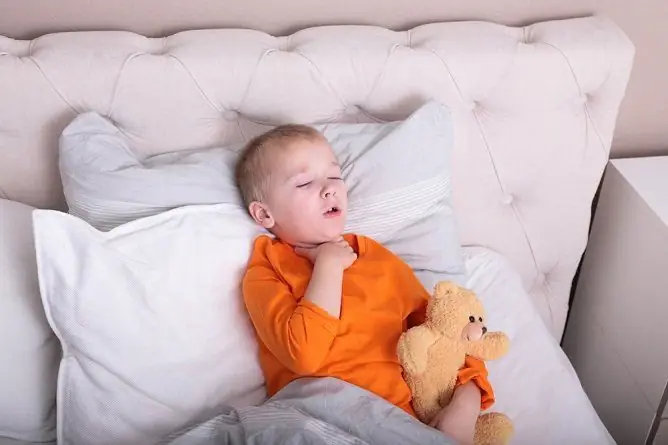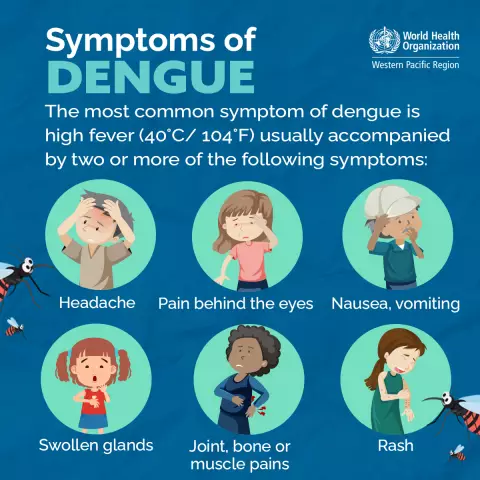- Author Rachel Wainwright wainwright@abchealthonline.com.
- Public 2023-12-15 07:39.
- Last modified 2025-11-02 20:14.
Night cough in a child: causes and treatment
The causes of a nocturnal cough in a child are different. It may indicate a common cold or a more serious illness. A night cough does not allow full rest, it is exhausting for both the child and the parents.

Coughing fit
Features of a night cough
A cough is a reflex act characterized by a sharp and forced exhalation. It has a protective function, as it is aimed at clearing the upper respiratory tract from mucus, dust, bacteria and viruses.
Sometimes a cough stops performing a protective function and depletes the body more than helps it. This is often seen if the cough occurs during sleep.
There are several explanations for why the cough occurs or worsens at night:
- cough may appear due to the activation of the parasympathetic system. Night is the "kingdom of the vagus" (vagus nerve). Heartbeat, breathing slows down, bronchospasm and cough reflex increase. This mechanism of coughing is observed in bronchial asthma and bronchitis;
- at night, esophagospasm, secretion of gastric juice increases, which causes a cough in gastroesophageal disease;
- cough can occur reflexively when the posterior pharyngeal wall and larynx are irritated. This is observed with adenoiditis or sinusitis, when in a horizontal position mucus enters the larynx;
- coughing can begin if the child breathes through the mouth. If the air in the room is dry, it causes the mucous membranes to dry out, which can trigger a cough.
Night cough is dangerous because it disrupts sleep and does not allow the child's body to recover normally.
Causes of a night cough in a child
Night cough is not a specific symptom; it can occur with various diseases. It is important to determine the cause before starting treatment.
In children, coughing at night can be a symptom of such diseases:
- bronchial asthma;
- Chronical bronchitis;
- rhinitis, sinusitis;
- gastroesophageal reflux disease (GERD);
- whooping cough.
ARI
The most common cause of nocturnal cough is acute respiratory disease (ARI). ARI occurs when viruses or bacteria enter the respiratory system. The infection can affect the nasal cavity, sinuses, bronchi, leading to rhinitis, sinusitis, or bronchitis. The general criterion for diseases in this group is an increase in temperature.
Bronchitis
With bronchitis, the child coughs up phlegm. But in the first week of the disease, there is no sputum, the cough is dry, loud. Signs of intoxication are present: weakness, lethargy, increased fatigue.
Chronic bronchitis is also accompanied by a nocturnal cough. In this case, the cough is loud, accompanied by copious secretion of mucous or mucopurulent sputum. Symptoms of intoxication are mild.
Sinusitis and rhinitis
With sinusitis and rhinitis, the cough is dry. It occurs due to reflex irritation of the larynx when mucus flows. There is practically no cough during the day. Characterized by nasal congestion, difficulty in nasal breathing, the child breathes mainly through the mouth. Signs of intoxication are poorly expressed.
Bronchial asthma
A nocturnal cough can be a sign of bronchial asthma (especially with a cough variant of bronchial asthma). There may be no other symptoms. Bronchial asthma occurs when the bronchi are hyperresponsive in the presence of an allergen. Often the material from which the pillow is made (fabric, feathers) acts as an allergen.
Whooping cough
A severe nocturnal cough in a child may indicate a dangerous infectious disease - whooping cough, which is caused by a specific bacterium. The main symptom of the disease is a prolonged spasmodic cough that worsens at night. The cough is paroxysmal, the attack lasts from a few seconds to 15 minutes. After the attack, a convulsive breath follows, which is accompanied by a hissing sound. Additional symptoms are fever, nasal discharge.
GERD
A nocturnal cough in childhood can be caused by GERD, a condition characterized by the discharge of stomach contents into the esophagus (reflux). This leads to irritation of the esophageal mucosa, resulting in cough, heartburn, and sour belching. Symptoms are aggravated by lying down.
How to find out the cause of a cough
ARI, rhinitis, sinusitis
To diagnose ARVI, a clinical picture is sufficient - symptoms of intoxication and local inflammation (rhinitis, bronchitis, sinusitis).
Bronchitis
If chronic bronchitis is suspected, radiographic (plain radiography of the lungs) and endoscopic methods are used. With a bacterial nature, sputum culture is also prescribed.
Bronchial asthma
Spirography, peak flowmetry and functional tests with Salbutamol are used to diagnose bronchial asthma. To identify the cause, tests with allergens are used. Additional methods are sputum analysis and complete blood count.
Whooping cough
Whooping cough can be suspected by a general blood test (an increase in leukocytes and lymphocytes). The final diagnosis is made on the basis of bacteriological research, methods of inoculation on life-giving media. The material is mucus from the back of the pharynx.
GERD
With GERD, a daily pH meter is used, which evaluates the amount of acid reflux into the stomach. To assess the condition of the esophagus, an endoscopic method is used.
General recommendations for an attack
You can alleviate the child's condition using general recommendations:
- for young children, a change in body position can be effective;
- you can reduce nighttime attacks by humidifying the air. To do this, you need to use special humidifiers or place containers with water in the room where the child is;
- inhalation. They can be done with alkaline solutions (water with soda, alkaline mineral water), or with medications prescribed by a doctor. For their implementation, a nebulizer is used;
- at the beginning of the attack, you can give the child a warm liquid to drink. It can be tea, milk, rosehip broth, compote or water.
The listed methods are not applicable for children under 1 year old. For babies, you can change the position of the body, use a high pillow. This will help prevent phlegm from accumulating during sleep.
Further treatment
After stopping the attack, you can start full treatment. Cough is not a separate disease, but only a symptom of pathology. Therefore, the key direction of therapy is the treatment of the underlying disease.
ARVI
If a nocturnal cough has developed against the background of acute respiratory viral infections, mucolytics are used for treatment, drugs that facilitate the passage of mucus. Their action is aimed at enhancing mucociliary clearance - a system of outgrowths of the mucous membrane and mucus, which cleans the upper respiratory tract. This is achieved by enhancing the work of the cilia or by thinning the phlegm.
Mucolytics include:
- Ambroxol;
- Carbocisteine;
- Bromhexine.
Mucolytics are also produced in the form of syrups:
- Ambrobene;
- Lazolvan;
- Alteika.
When taking them, it is contraindicated to stop the cough by any methods, as this can lead to stagnation of sputum and the attachment of secondary bacterial flora.
It is not necessary to treat ARVI with antibiotics; it is enough to give the child plenty of fluids and stay in bed.
Bronchial asthma
The main component of cough treatment for bronchial asthma is to eliminate contact with the allergen. Medical therapy is selected by the doctor, depending on the severity of the disease. In bronchial asthma, drugs are used that expand the lumen of the bronchi and reduce signs of inflammation. It can be inhaled medications or oral medications - oral tablets. In bronchial asthma, bronchodilators (inhaled beta-adrenomimetics, M-anticholinergics) and steroid anti-inflammatory drugs help.
Bronchitis
In chronic bronchitis, treatment has an integrated approach. Used mucolytics, inhalations, vibration drainage, with the bacterial nature of inflammation - antibiotics.

Antitussives are not prescribed for children under one year old, as they can lead to respiratory arrest
Whooping cough
If the pertussis nature of the cough is established, antibiotics are prescribed. Means from the macrolide group are used, for example, Azithromycin. Whooping cough is dangerous by the development of acute respiratory failure, hemorrhages in internal organs. To avoid the development of complications, the child is hospitalized.
GERD
Treatment for GERD is to eliminate reflux. This is accomplished with medication or surgery. Drug treatment includes the use of antisecretory drugs, antacids, prokinetics. Surgical intervention is used for hiatal hernia.
Symptomatic treatment is rarely used, only in severe cases. If the cough does not allow the child to sleep, its frequency exceeds 10 attacks per night, the general state of health suffers, and antitussive drugs can be used. They inhibit the cough center located in the medulla oblongata, thereby reducing seizures. Despite the effectiveness, antitussives are dangerous for the child's body, therefore they are rarely used. For babies under 1 year old, antitussive drugs are contraindicated, since their use can lead to respiratory arrest.
Video
We offer for viewing a video on the topic of the article.

Anna Kozlova Medical journalist About the author
Education: Rostov State Medical University, specialty "General Medicine".
Found a mistake in the text? Select it and press Ctrl + Enter.






